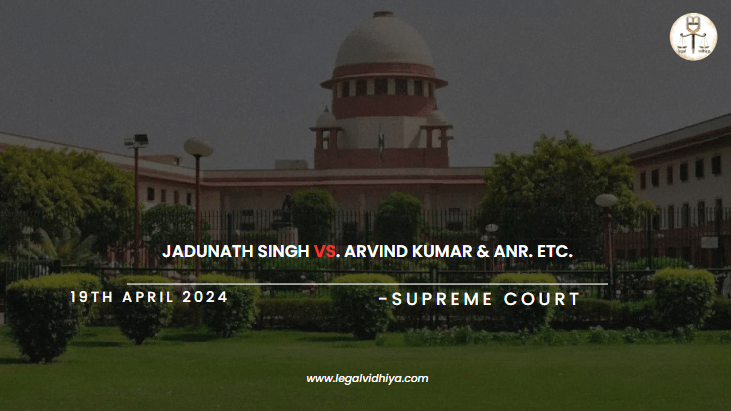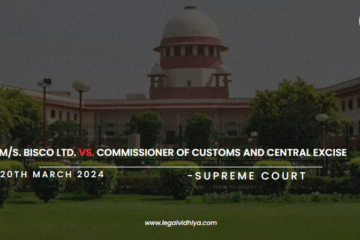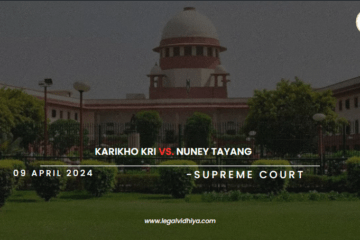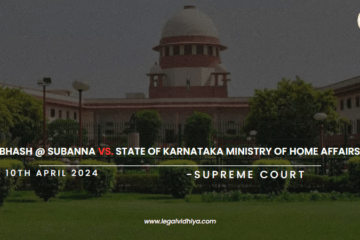
| CITATION | 2024 INSC 325 |
| DATE OF JUDGMENT | 19th April 2024 |
| COURT | Supreme Court of India |
| APPELLANT | Jadunath Singh |
| RESPONDENT | Arvind Kumar & Anr. |
| BENCH | Justice Vikram Nath, Justice Sanjay Kumar |
INTRODUCTION
The case of Jadunath Singh vs. Arvind Kumar & Anr. Deals with the challenge against the bail granted by the Allahabad High Court to the accused involved in a serious criminal case. The accused, Arvind Kumar, Chandra Kumar, and Rishi Kumar, were convicted of murder and other charges, with two of them later involved in the murder of a police constable while in judicial custody. This case brings into question whether the High Court appropriately considered the full scope of the accused’s criminal conduct when granting bail.
FACTS OF THE CASE
- On February 11, 2011, Jadunath Singh, the appellant and complainant in this case, reported that Arvind Kumar illegally occupied a plot in Village Bhogaon. Later, Singh’s son, Rajvir, removed Kumar as per the District Magistrate’s order.
- Around 11:45 AM the same day, Jadunath Singh, along with his son Rajvir, Pawan Kumar, Rawan Kumar, Upendra, and Chedalal, were discussing the plot when Arvind Kumar, armed with a country-made pistol, along with his sons Chandra Kumar and Rishi Kumar, accompanied by Amit Kumar and two unknown individuals carrying rifles, arrived in a white Maruti 800 and immediately opened fire on Singh and the others present.
- Jadunath Singh and his companions sought refuge in a nearby building owned by Harvilas, but the attackers managed to intrude and continued firing. During the attack, Rajvir and Pawan Kumar were fatally shot, and Ravita, the daughter-in-law of Harvilas, was injured.
- Upon arrival at the hospital, Rajvir and Pawan Kumar were declared dead. Pawan Kumar’s death was due to a chest gunshot wound causing excessive bleeding, while Rajvir had multiple fatal wounds. Two injuries were found on Rajvir’s shoulder and one on his chest.
- Based on Jadunath Singh’s complaint, charges were filed against seven named accused under various sections of the Indian Penal Code (IPC), including rioting, murder, attempt to murder, and criminal conspiracy.
- The trial court convicted Arvind Kumar, Chandra Kumar, Pramod Kashyap, Rishi Kumar, and Aadesh Kumar under IPC sections including murder and conspiracy, sentencing them to life imprisonment. Two other accused, Monu and Amit Kumar, were acquitted of all charges.
- On January 31, 2013, while in custody, Rishi Kumar and Chandra Kumar shot and killed Constable Ajay Kumar outside the Mainpuri Sessions Court during a break. They disposed of the constable’s body in front of a local house. This incident led to murder charges against Rishi Kumar, Chandra Kumar, and others, with additional charges related to conspiracy.
- After the murder, Chandra Kumar and Rishi Kumar absconded and were later arrested by the Special Task Force (STF) in Maharashtra. During their arrest, they again opened fire on the police party, resulting in another criminal case being filed against them.
ISSUES RAISED
- Whether the bail granted to Arvind Kumar, Chandra Kumar, and Rishi Kumar by the Allahabad High Court was justified.
- Whether the subsequent criminal conduct of Chandra Kumar and Rishi Kumar should affect their bail status.
- Whether the period of incarceration alone is sufficient grounds for granting bail to the accused.
- Whether the High Court was aware of the respondents’ criminal activities and previous convictions while granting bail.
CONTENTIONS OF APPEALENT
- The appellant contends that the accused persons, Arvind Kumar, Chandra Kumar, and Rishi Kumar, are involved in serious criminal activities, including two murders initially and the subsequent killing of Police Constable Ajay Kumar during trial proceedings.
- It is argued that granting bail to the accused poses a threat to public safety, as there is a fear that they may conspire against the complainant and his family upon release.
- The appellant challenges the High Court’s decision, arguing that it did not adequately consider Chandra Kumar and Rishi Kumar’s full criminal history and conduct, which should have been critical factors in denying bail.
- It is pointed out that Chandra Kumar and Rishi Kumar had absconded and were involved in violent activities, including resisting arrest and firing upon the police during their capture in Maharashtra, thus highlighting their dangerous nature.
CONTENTIONS OF REPONDENT
- The respondents argue that they have been incarcerated for more than ten years, justifying their request for bail during the pendency of their criminal appeals.
- They point out that two co-accused, Pramod Kashyap and Aadesh Kumar, were granted bail by a coordinate bench of the same High Court, therefore similar treatment should apply to them.
- It is highlighted that bail was granted to them under strict conditions, including a personal bond and sureties, to ensure their compliance with legal requirements.
- The respondents clarify that Arvind Kumar is not implicated in the murder case of Police Constable Ajay Kumar, distinguishing his situation from that of Chandra Kumar and Rishi Kumar.
JUDGEMENT
The Supreme Court, after carefully reviewing the facts and evidence, concluded that the High Court failed to adequately consider critical details about the conduct of the accused, Chandra Kumar and Rishi Kumar, while granting bail. Despite being incarcerated for over ten years, these two are not eligible for bail due to their involvement in the murder of Police Constable Ajay Kumar while in judicial custody and their subsequent absconding. This action significantly distinguishes their case from that of their co-accused, who were granted bail. On the other hand, Arvind Kumar, who is not charged in the constable’s murder, is allowed to retain his bail as the Supreme Court sees no reason to interfere with the High Court’s decision to grant him bail. Therefore, the appeal against Arvind Kumar is dismissed. However, due to the severity of their crimes and subsequent criminal conduct post-incarceration, the appeals against Chandra Kumar and Rishi Kumar are upheld, resulting in the cancellation of their bail. Chandra Kumar and Rishi Kumar are ordered to surrender within two weeks, failing which the High Court will take necessary legal steps to take them into custody.
ANALYSIS
The Supreme Court reviewed the High Court’s decision to grant bail to the accused, Chandra Kumar and Rishi Kumar, and found that the High Court had granted bail considering two factors: the period of incarceration and the fact that two other co-accused had been granted bail. However, the Supreme Court observed that the High Court was not informed of crucial facts, such as Chandra Kumar and Rishi Kumar’s involvement in the murder of Police Constable Ajay Kumar while in custody. After murdering Constable Ajay Kumar, they absconded and were later apprehended by the Special Task Force in Maharashtra, where they resisted arrest and engaged in a shootout with the police, leading to additional charges. These significant details, which were not presented to the High Court, were crucial in distinguishing their case from that of their co-accused. The other co-accused, Adesh Kumar and Pramod Kashyap, were not involved in the murder of the police constable, making their situations clearly different. The Supreme Court emphasized that these relevant facts should have been considered by the High Court, as they significantly impact the evaluation of the bail application for Chandra Kumar and Rishi Kumar.
CONCLUSION
In conclusion, the Supreme Court highlighted the necessity of presenting complete and relevant facts in bail considerations, particularly the severity of subsequent criminal actions by the accused. The Court cancelled the bail for Chandra Kumar and Rishi Kumar due to their involvement in further crimes, including the murder of a police constable and their violent resistance to arrest. However, it upheld the bail for Arvind Kumar, as his circumstances were distinct, and he was not implicated in the additional criminal activities. This ruling emphasizes the judiciary’s role in ensuring that bail decisions are made with a full understanding of an accused’s criminal history and potential threat to public safety.
REFERENCES
This Article is written by Ananya Saren, student of Surendranath Law College, University of Calcutta; Intern at Legal Vidhiya.
Disclaimer: The materials provided herein are intended solely for informational purposes. Accessing or using the site or the materials does not establish an attorney-client relationship. The information presented on this site is not to be construed as legal or professional advice, and it should not be relied upon for such purposes or used as a substitute for advice from a licensed attorney in your state. Additionally, the viewpoint presented by the author is of a personal nature.




0 Comments